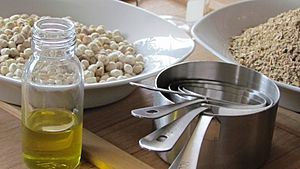Ben oil facts for kids
Ben oil is a special oil that comes from the seeds of a tree called Moringa oleifera. This tree has many names, like the horseradish tree or the drumstick tree. Ben oil is known for lasting a very long time without going bad. It also has a mild and pleasant taste. The oil gets its name from a type of fat called behenic acid, which is found in it.
The seeds of the moringa tree give a good amount of oil, usually between 22% and 38%. Ben oil is mostly made of Oleic acids (about 65%). It also contains other important fats like Palmitic acid, Stearic acid, and Behenic acid. For thousands of years, ben oil has been used as a base for perfumes. People still use it for this purpose today. This oil can also be used as a fuel. It burns with a clear light and does not make smoke. It is also a great oil for salads and can be used to make good soap. Some people even used it to oil machines, especially delicate ones like watches.
Contents
History
Ancient Greece
The ancient Greeks made ben oil and other plant-based oils. Around 300 BC, a famous Greek writer named Theophrastus had strong ideas about which oils were best for making perfumes. Ben oil was always his top choice.
Ancient Rome
In Rome, around 70 AD, a writer named Pliny the Elder wrote about the moringa tree and its fruits. He called them myrobalanum, which came from a Greek word meaning "ointment." Around the same time, another writer named Dioscorides described the fruit as balanos myrepsike. This roughly means "acorn-shaped fruit good for making fragrant ointments." He noticed that grinding the kernels, like bitter almonds, made a liquid. This liquid was used instead of other oils to prepare valuable ointments. Dioscorides' advice helped make the "balanos" fruits and their oil popular for health uses.
Alexandria's Perfume Center
During this time, Alexandria in Egypt became the main place for making perfumes. This was still true when the Arabs took over the city in 642 AD. The Arabs learned about both the fruits and the oil. The Arabic word for myrobola included not just the fruit, but also the oil and other plant oils made from it. Sometimes, these Arabic plant oils included myrrh resin and different types of cardamom. This led to a common mix-up. In the 1500s, Portuguese plant experts explored the Far East. They spent years trying to find the tree that made the fragrant myrobalan oil. Eventually, they realized it was just an extract from a plant they already knew.
Ben Oil in Europe
Another mix-up happened when a new fruit from Malaysia reached Europe through the Arabs. Europeans confused it with myrobalum and called the new fruits "myrobalans." The problem was solved by simply giving the old fruit a new name. They borrowed the Arabic word bân for the new name. This was enough to tell the two products apart. However, confusion was still common for several hundred years because both were used in medicines. The ben fruits from ancient times were not exactly the same as the ben fruits we know today.
Jamaica's Interest
People in Jamaica became interested in ben oil in the early 1800s. The oil was known for being very long-lasting. It was often used to lubricate delicate machines, like clocks. In 1848, the oil was studied for the first time. Scientists found a new type of fat called behenic acid in it.
Grasse and Perfume
At the perfume factories in Grasse, France, ben oil was used to soak plants to extract their scents. This continued until the 1870s, when cheaper oils, alcohol, and new solvents replaced it. In the 1930s, it was used again, but then it was forgotten as a perfume ingredient. This was probably due to political problems in many European colonies. Ben oil was also forgotten as a watch oil for most of the rest of the 1900s.
Modern use
Use in Skin Care
In the early 2000s, the demand for ben oil started to grow again. This is largely because it is being used more and more as a cosmetic oil, also known as a "beauty oil."
Because more people around the world want ben oil, many African and Caribbean countries have started to produce it. These countries have climates that are perfect for growing the moringa tree, so they can grow it to export the oil.
See also
 In Spanish: Aceite de behen para niños
In Spanish: Aceite de behen para niños
 | Mary Eliza Mahoney |
 | Susie King Taylor |
 | Ida Gray |
 | Eliza Ann Grier |


